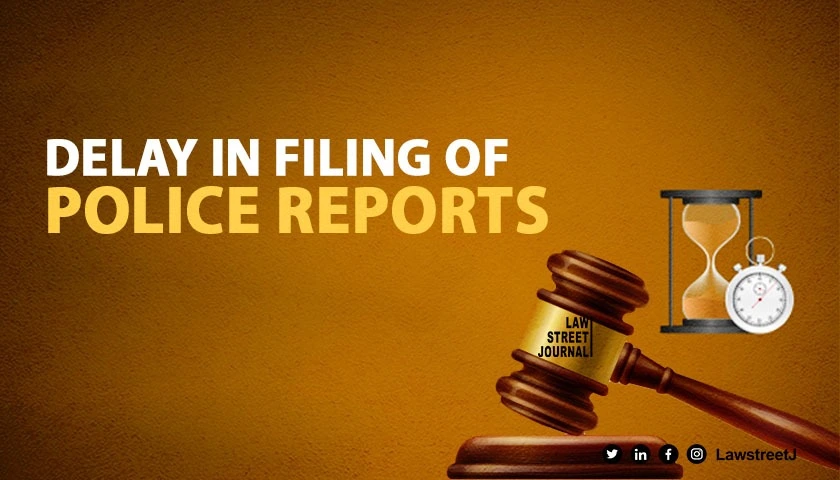New Delhi: Reacting over the several reports of delay in filing case reports by investigating officers, the Deputy Commissioner of Police of South West District has ordered the police officials to conduct an exercise and give the break up of the cases of last six years.
The timely submission of case reports stands as a crucial pillar of accountability and justice. However, recent revelations in the South-East District of New Delhi have unveiled a systemic issue: the delay in filing case reports by investigating officers(IOs).
This concern, echoing through the corridors of justice, has prompted a proactive response from the Delhi Police authorities.
At the heart of the matter lies a fundamental disconnect between the completion of investigations and the subsequent filing of final reports in court. It has been brought to light that after wrapping up their investigation, IOs obtain approval on final reports from authorised officials but withhold the police report, without clear justification.
This unnecessary delay in filing reports not only hampers the swift administration of justice but also undermines public confidence in law enforcement agencies.
The gravity of the situation became unmistakably apparent when judicial authorities, including the esteemed Mr Abhitesh Kumar, Ld. MM-08 of the SED Saket Court in New Delhi, identified the issue. In a significant order dated 2.03.2024, pertaining to FIR No. 489/2021, PS Jamia Nagar, he highlighted this persistent issue and forwarded its concerns to the office of the Commissioner of Police.
Such judicial intervention underscores the imperative for immediate action to address the systemic shortcomings within the investigative framework.
Responding to the judicial scrutiny and in a bid to rectify the procedural lapses, the Deputy Commissioner of Police for the South-East District issued a directive dated 19/03/2024. This directive, addressed to all Assistant Commissioners of Police (ACSP) and Station House Officers (SHOs) within the district, mandates a comprehensive review of cases spanning the past six years, from January 2018 to the present.
The directive requires ACSPs and SHOs to meticulously scrutinize cases where final reports were forwarded to the court but road certificatesvital documents signifying filing of police reports in courtwere not received back within the stipulated timeframe. This exercise aims to provide a detailed breakdown of such cases, facilitating a deeper understanding of the extent of the issue and its underlying causes.
Furthermore, to ensure accountability and expedite remedial measures, the directive sets a strict deadline for the submission of compliance reports. All concerned officers instructed to furnish their findings to the designated office by 21.03.2024, emphasizing the importance of timely action in addressing theidentified deficiencies.
The enforcement of this directive is underscored by a clear warning: noncompliance will be met with severe consequences. This firm stance reflects the commitment of law enforcement authorities to uphold the principles of transparency, efficiency, and accountability in their operations.
Beyond the immediate ramifications for individual officers, the broader implications of this directive are significant. In the intricate tapestry of the criminal justice system, the magistrate serves as a vital pillar, embodying impartiality, discernment, and adherence to the rule of law.
Tasked with the weighty responsibility of adjudicating over preliminary legal proceedings, magistrates stand as guardians of justice, ensuring due process and safeguarding the rights of both the accused and the society at large. With a keen eye for evidence and a commitment to fairness, they meticulously weigh the scales of justice, guiding cases towards resolution with sagacity and integrity.
As custodians of judicial oversight, magistrates wield their authority with judicious restraint, fostering an environment where justice is not only meted out, but also perceived to be so, fostering public trust and confidence in the legal system.
Moreover, this directive serves as a testament to the dynamic relationship between law enforcement agencies and the judiciary. It underscores the importance of collaboration and mutual accountability in upholding the rule of law and ensuring the efficient functioning of the justice system.







![NewsClick received funds from Chinese firms to create false narratives: Delhi police FIR [Read Order]](/secure/uploads/2023/10/lj_9371_b4600c46-2a07-4866-b478-1c7683cd8363.jpg)
![Delhi High Court asks RBI, MHA to respond on various aspects of fraudulent digital bank transactions [Read Order]](/secure/uploads/2023/11/lj_3880_WhatsApp_Image_2023-11-29_at_4.49.08_PM.jpeg)

![Parliament security breach: Former DCP LN Rao calls for SOP for crime reporting [Watch Video]](/secure/uploads/2023/12/lj_6987_fb4a149e-b55e-447b-90cd-ab83b39cdc46.jpg)






